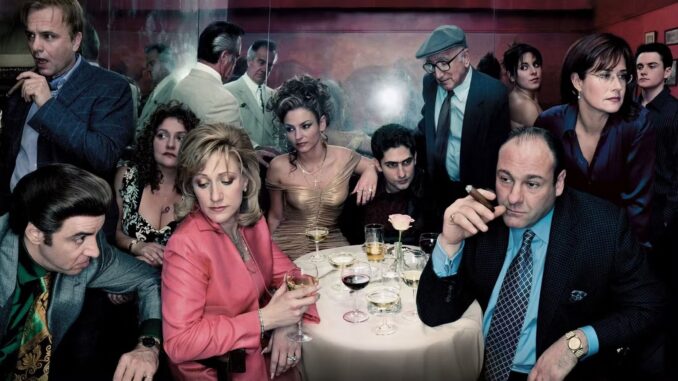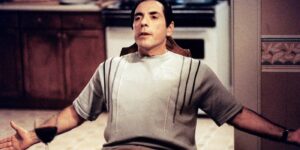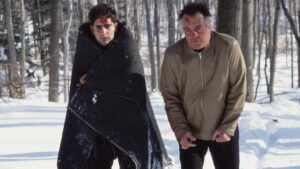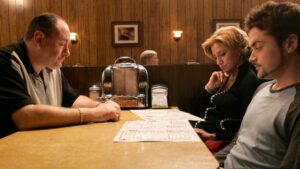
The Sopranos is, well, The Sopranos, a TV show that’s rightfully held up as one of the greatest of all time, if not the greatest of all time. It followed a middle-aged man named Tony Soprano as he balanced family life, his criminal career, and his ongoing therapy sessions, and ran for six seasons that aired between 1999 and 2007, with a total of 86 episodes. Admittedly, not every individual episode is absolutely perfect, but a good many are, on their own, rather masterful (with all, of course, adding up and complementing each other in a way that makes the whole show pretty much perfect).
But to highlight some of the very best hours from this already top-quality show, what follows are some of the episodes that essentially stand out as perfect. Anyone new to The Sopranos should obviously watch from the start, but to highlight what the show was capable of at its very best, here are some of its episodes that ended up being pretty much perfect.
10 “College” (1999) Season 1, Episode 5

To start off with an episode many consider the first truly great one in the history of The Sopranos, here’s “College,” which was just the fifth episode of the show’s first season. The earlier episodes had effectively introduced the show’s ensemble cast, but “College” was an opportunity to tell a more self-contained story, and one that also allowed two key characters to venture out of New Jersey and into Maine.
“College” primarily focused on Tony taking his daughter, Meadow, to see potential colleges in the area, along the way having to work out what to do when he sees an ex-associate who went into the witness protection program after testifying against some mobsters. The clash between Tony’s violent way of life in his “professional” career and his desire to take care of his family becomes explicit here, and it’s a similarly impactful episode for showing what the supposed protagonist of a show like The Sopranos was capable of doing.
9 “Whoever Did This” (2002) Season 4, Episode 9

By season 4 of The Sopranos, the show had already more than earned a reputation for killing off characters (or, to borrow a mob-themed phrase from the show, “whacking” them). With Ralph Cifaretto, it wasn’t a case of if he’d die, but when, and he lasted pretty long for a character who was more or less an antagonist in the show; someone to whom the other gangster characters didn’t look quite as evil in comparison.
Still, “Whoever Did This” manages to make Ralph’s death feel surprising, given it happens in the fifth-last episode of the season (it’s more common for big deaths to happen in the last two episodes of any given season), and because the episode also makes Ralph more sympathetic than ever before, after his son is gravely injured. The way he dies also manages to be fairly brutal, and the extended clean-up process – with a disoriented Tony and a high Christopher Moltisanti – is similarly impactful, being surreal, queasy, and darkly funny.
8 “Soprano Home Movies” (2007) Season 6, Episode 13

Standing as one of the show’s most somber episodes, “Soprano Home Movies” kicks off season 6B, with its nine episodes airing in 2007 after season 6A’s 12 episodes aired in 2006. It has the feel of an opening episode, in a way, more by setting certain conflicts and themes that will play a part in the show’s final episodes than by introducing new characters or whole storylines.
“Soprano Home Movies” is mostly about a birthday weekend for Tony going wrong, after he and his brother-in-law, Bobby Bacala, get in a violent fight over comments Tony made about his sister/Bobby’s wife, Janice. It might not be as explosive or wide-reaching as later episodes dealing with gang warfare, but the way Bobby’s changed from this episode going forward is rather heartbreaking. What Tony makes Bobby do, effectively as punishment for the fight, represents a new moral low for the show’s ever-flawed protagonist.
7 “The Knight in White Satin Armor” (2000) Season 2, Episode 12

It’s impossible to feel bad for Richie Aprile in “The Knight in White Satin Armor,” given he’d spent almost an entire season being reprehensible in a similar way to the aforementioned Ralph Cifaretto. Both also got involved with Janice before Bobby, and Richie even came uncomfortably close to marrying Janice, but behaved in a way that put both him and the plans permanently to rest.
He pushes Janice too far, verbally berating her and then punching her in the mouth, making the following moment – when Janice shoots him dead without warning – rather cathartic, and a moment when she probably becomes a little more endearing for most viewers (she continues to have her flaws, like anyone, but she’s the MVP of this episode). “The Knight in White Satin Armor” is a great episode for the way it subverts the more expected route such an episode would take (like featuring Tony and his crew taking out Richie), and it also expertly sets up season 2’s finale, which is arguably even better.
6 “Long Term Parking” (2004) Season 5, Episode 12

So, there have been mentions of deaths of characters who largely had it coming – namely, Ralph and Ritchie – but characters who fall on the more sympathetic or morally right side of things (at least by the show’s standards) are, sadly, just as mortal. No episode drives this home quite as painfully as “Long Term Parking,” the penultimate episode of The Sopranos’ fantastic fifth season.
Adriana’s status as an FBI informant is finally discovered in this episode, leading for the inevitable to happen, with the show’s most tragic and arguably most sympathetic getting cruelly removed at a point when The Sopranos still had 22 episodes left to go. The entire episode is mournful and filled with dread, and is rightly considered one of the show’s finest hours for the emotional gut punch it delivers.
5 “Pine Barrens” (2001) Season 3, Episode 11

To get a little lighter, “Pine Barrens” is one of the most acclaimed episodes of The Sopranos that doesn’t feature a noteworthy death, and is renowned for its comedy more than anything else. It feels like it drops Christopher and Paulie into a Coen Brothers movie, with the pair unsuccessfully trying to carry out a hit before getting hopelessly lost – and nearly dying – in the woods.
Given the two are morally bankrupt and often quite stupid, it’s easy to find the whole thing very amusing, and the “rescue mission” Tony and Bobby go on is also amusing. “Pine Barrens” continues to build upon storylines and develop character dynamics in a typically strong way for the show’s standards, but it also provides additional comedy with a unique premise, all within a show that’s already quite funny and keen to explore inventive ideas for one-off episodes.
4 “Whitecaps” (2002) Season 4, Episode 13

“Whitecaps” proved particularly successful at the Emmys, and is one of the greatest episodes of a show that was, in general, quite beloved by the most prestigious television awards show in the U.S. As mentioned before, Ralph died well before the end of season 4, allowing the final chunk of episodes of said season more time to spend on the family side of Tony’s life, especially his strained marriage with Carmela.
Things reach a breaking point in “Whitecaps,” and there are scenes depicting the final stages of their deteriorating marriage that give a movie like Marriage Story a run for its money, as far as emotional intensity goes. James Gandolfini and Edie Falco are both at their absolute best here, with their performances alongside the writing making “Whitecaps” one of the most devastating episodes of The Sopranos.
3 “The Blue Comet” (2007) Season 6, Episode 20

It’s only natural that the death count gets high toward the end of a show like The Sopranos, with season 6 (if you include 6A and 6B) being easily the deadliest for the show’s characters. Things slowly escalate before exploding in “The Blue Comet,” which is the penultimate episode of the show’s entire run, and deals with an all-out war being fought between Tony’s North Jersey crew and Phil Leotardo’s New York crew.
Numerous characters either die or become seriously injured, and the stakes feel higher than they’ve ever been as “The Blue Comet” ends, setting up the finale to come. It’s a dizzying and tragic episode, and perhaps one of the most exciting (or at least nerve-wracking) The Sopranos ever had, which naturally helps it stand out as a series highlight.
2 “Made in America” (2007) Season 6, Episode 21

The perfection present in “The Blue Comet” continues in “Made in America,” though this series finale is a masterpiece in a different kind of way to “The Blue Comet.” The gang warfare dies down surprisingly fast, with the seeming solution being to arrange the murder of Phil Leotardo. But, even once that’s done, something doesn’t feel right. There’s a sense of things being off throughout this finale.
It makes “Made in America” surprisingly eerie, though it certainly doesn’t represent the only time The Sopranos got kind of creepy. There’s a coldness to this episode, and a sense of emptiness, given how many main characters are dead, dying, or almost totally alienated by this point in the show. Then, of course, there’s the legendary final scene which, love it or hate it, is unforgettable, and proved to be an astoundingly bold way to end an oftentimes astoundingly bold TV show.
1 “Funhouse” (2000) Season 2, Episode 13

By the end of season 2, The Sopranos had already demonstrated it was good enough to be one of the all-time great TV dramas, but “Funhouse” just made that all the more apparent, and took things to new heights. Following the surprisingly fast defeat of Richie in the previous episode, Tony and his crew turn to another problem that needs dealing with: the fact that one of their own might’ve become an informant.
The mob’s no-tolerance policy regarding informants becomes clearer than ever in “Funhouse,” and the slowly dawning, inevitable conclusion to it all is both distressing and uncomfortable to watch. Also, “Funhouse” showcases The Sopranos at its most surreal and visually daring, given Tony spends much of the episode with food poisoning, and the audience gets to see many of his alarming fever dreams. It’s an episode that reshapes the status quo while also having an inventive premise and some odd creative choices that all pay off. Essentially, “Funhouse” is The Sopranos at its most perfect.
